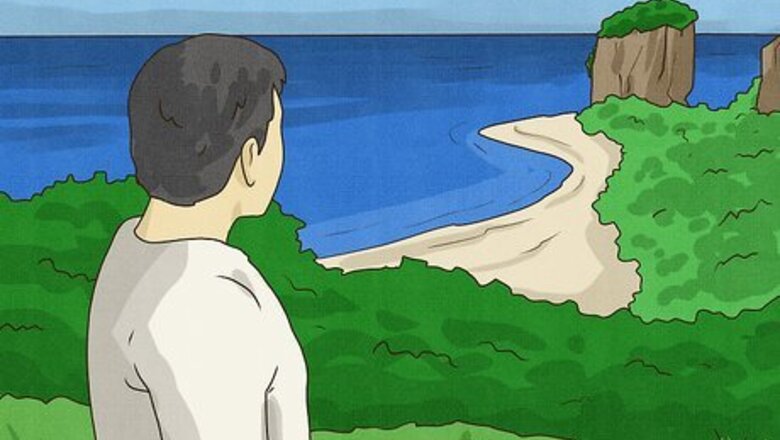
views
X
Trustworthy Source
Harvard Medical School
Harvard Medical School's Educational Site for the Public
Go to source
Anxiety and depression also frequently come hand and hand, so chances are if you have anxiety, you have depression, and vice versa. We know that dealing with anxiety and depression is no fun. Fortunately, there are ways you can decrease your anxiety and depression, such as through making lifestyle changes and trying different coping techniques. Give some of the ideas on this list a shot to help yourself start feeling better today.
Get outside more.
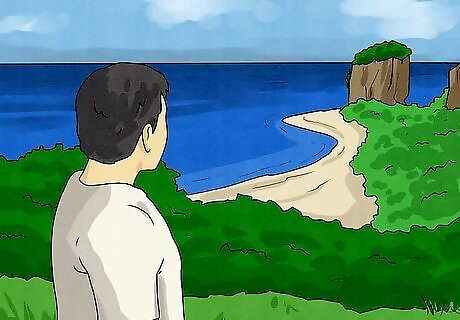
More time outside is linked with lower depressive symptoms. Go for a lunchtime walk or read a book in a park. Get out of the city and go on a hike or spend time by the ocean, a river, or a lake. Anything that you enjoy that allows you to be outside more is great! Even if you can’t be outside all the time, just looking outside can help reduce feelings of anxiety and depression. If you work at home, move your desk in front of a window so you can look outside while you work, for example.
Take up a new hobby.
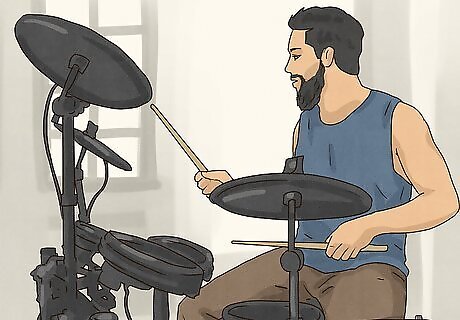
Spending time on hobbies can distract you from anxious feelings. Think of what you’re passionate about and what hobby you could do related to that. Spend at least an hour or more on that hobby every week. For example, if you like board games, you could start up a weekly game night with friends or coworkers. Or, if you like to make art, you could get some paints and some canvases and start painting on the weekends or after work in the evenings.
Read the news less.

Scrolling through news updates too much can cause feelings of hopelessness. Stop reading (or watching) the news unless you feel you really need an update on something. Most of the news doesn’t directly affect your life, so don’t let it affect your mental health! For example, if you spend every morning reading updates about COVID-19, your outlook on life might start to get pretty bleak. Instead, just read updates once or twice a week to get the critical info you need without letting anxious thoughts overcome your mind.
Reduce your social media use.

Heavy social media use is linked to feelings of depression and loneliness. Limit your time on platforms like Facebook, Instagram, and TikTok to 10 minutes a day. That way, you’re not as likely to compare your life to other people and are more likely to spend your time doing things that make you feel good! When you put the time you used to spend on social media into other activities, like reading, working out, socializing in real life, doing a hobby, or learning a new skill, you start to feel better about yourself, which can also help decrease anxiety and depression.
Laugh more often.
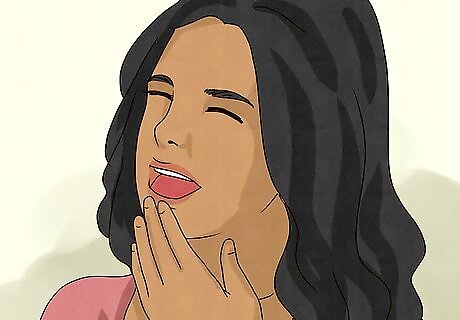
Laughter may really be the best medicine when it comes to anxiety. Seek out more humor and opportunities for laughter in your life. Go to a stand-up comedy show, watch funny movies, hang out with friends who make you laugh — do whatever it takes to get laughing! Besides easing anxiety and tension, laughing can also help reduce stress and improve moods.
Set personal boundaries.
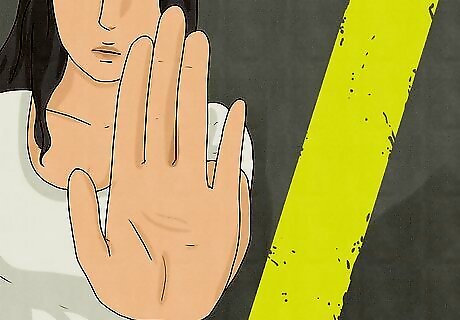
Creating boundaries in your relationships can reduce depression and anxiety. These can be both physical and emotional boundaries. Come up with physical and emotional guidelines, rules, and limits to give yourself time for self-care and reduce anxiety-causing behaviors in your relationships. For example, if you have anxiety because you feel like you and your significant other never have alone time, sit down and talk about it with them. Tell them you need space and time to yourself for work, exercise, hobbies, or whatever else it may be. Or, if you get anxiety when people are too close to you in social interactions, practice asking them politely to give you more space so you’re more comfortable and less anxious.
Try journaling your thoughts.
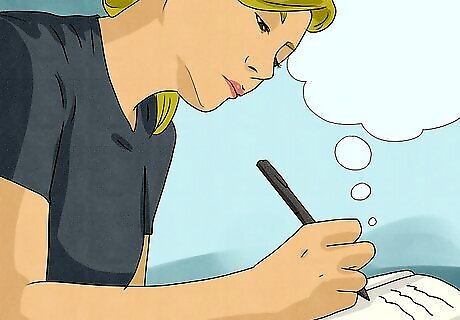
Writing can help you cope with anxiety and depression. Journal about your problems or worries that are making you feel anxious. If you aren’t sure what’s causing your anxiety and depression, write what you’re feeling whenever you have symptoms to try and identify the causes. Keep a pen and paper or journal handy at all times and try to dedicate a few minutes to writing every day. Your journal can take whatever form allows you to express yourself best. For instance, you can draw instead of write.
Practice mindfulness for stress-related anxiety.
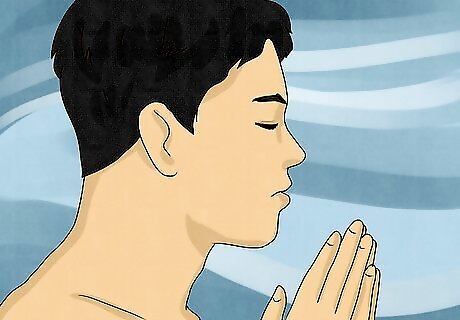
Mindfulness can help you reduce stress that leads to anxiety and depression. Try mindfulness exercises for stress and anxiety like deep breathing routines and meditation. Practice acknowledging your feelings of anxiety and depression and redirecting your mind elsewhere, such as to a specific task at hand. Mindfulness can be as simple as focusing 100% of your attention on the meal you’re eating or on your surroundings while you’re walking through a park.
Do yoga.
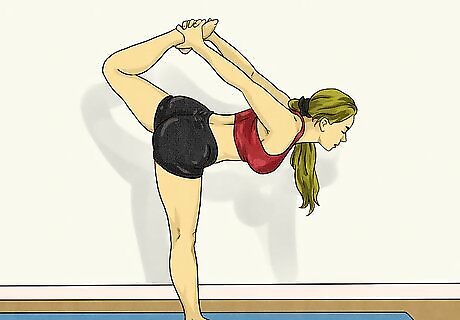
Yoga may improve symptoms of depression and anxiety. It is also closely linked to mindfulness because of its emphasis on breathing technique and getting in touch with all the sensations in your body. Try doing 1 60-minute session of yoga a week, along with some of the other techniques on this list, to see if your symptoms improve. Tai chi has also been linked to reducing anxiety and depression in a minor way.
Experiment with aromatherapy.
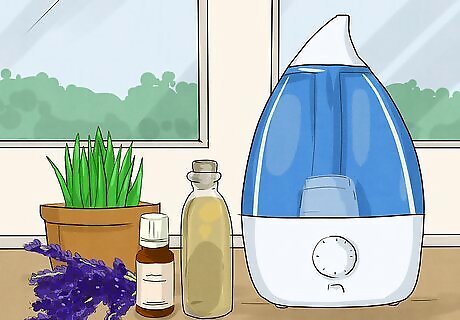
Some studies suggest that aromatherapy may relieve anxiety and depression. Try inhaling essential oils gently or applying them directly to your skin through a massage, lotion, or bath salts. Lavender essential oil is a good choice for relaxation and stress relief. Note that essential oils are not regulated by the FDA. If you’re considering using aromatherapy to treat your anxiety and depression, consult with your doctor first to discuss the possible risks and benefits.
Get counseling if you need coping skills.
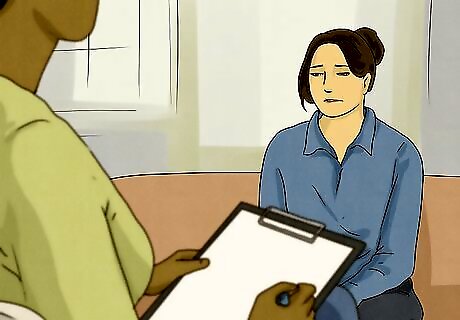
Support can help you overcome trauma that’s causing anxiety and depression. Seek out a counselor who has experience treating trauma. Start seeing them regularly to discuss the disturbing experience that’s responsible for your anxiety and depression and help reduce them. Counseling probably won’t get rid of trauma completely, but it can help you learn to live with it and prevent anxiety and depression from disrupting your life so much.
Limit your caffeine consumption.

Too much caffeine can increase anxiety. Coffee, tea, chocolate, and cola all contain caffeine. Reduce your consumption of these items and see if it helps reduce your anxiety and depression. This doesn’t mean you can’t have your cup of joe in the morning or in the afternoon. Just don’t drink 8+ cups of coffee a day, for example. Avoid caffeine especially in the late afternoon or evenings because it can reduce the quality of sleep if you have caffeine too late in the day.
Quit smoking if you’re a smoker.

Nicotine just increases feelings of anxiety. Quitting smoking is proven to increase your overall health as well as your mental wellbeing, including reducing anxiety and depression. Contact a local stop smoking service if you feel like you can’t quit on your own. You can also try weaning yourself off smoking by using nicotine patches or switching to e-cigarettes temporarily.
Eat well-balanced meals.
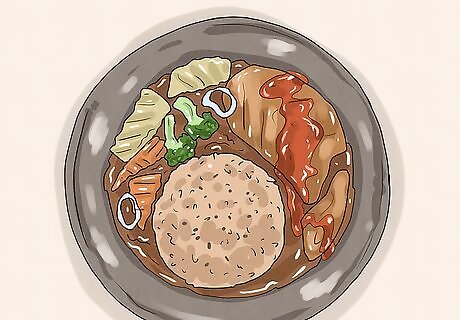
A healthy diet is linked to reduced anxiety and depression. Don’t skip meals and focus on eating whole, healthy foods at every meal. Keep healthy snacks on hand and stay away from junk food and highly processed packaged foods. Balanced diets contain whole foods such whole grains, vegetables, fruits, nuts, legumes, animal proteins, dairy, and healthy fats, like olive oil and avocados. Some foods that have been linked to lower anxiety include: fatty fish, avocados, asparagus, almonds, cashews, oysters, beef, egg yolks, and probiotic-rich foods, like yogurt.
Take omega-3 supplements.
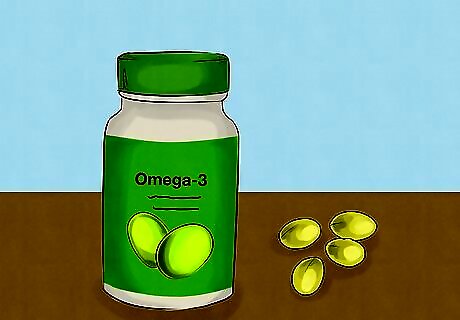
Omega-3 is found in many foods that may help treat depression and anxiety. For example, it’s found in fatty fish and nuts. Take a daily dose of omega-3 according to the recommendations on the packaging and see if it improves your symptoms. Omega-3 supplements are also known as fish oil. There are other supplements that may help you, but there is not enough research on them and they are not approved by the FDA. They also have more potential side effects than omega-3, so it’s probably better not to risk it. Omega-3 is considered to be very safe.
Exercise for 10-30 minutes daily.
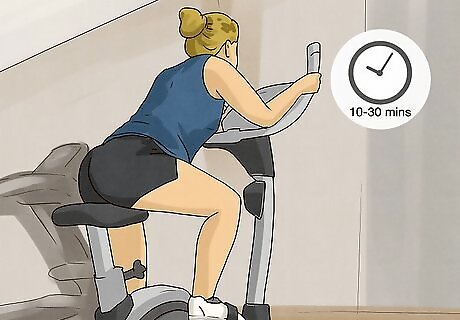
Exercise releases feel-good endorphins to treat anxiety and depression. Aim to get at least 10 minutes of moderate to vigorous physical activity each day. Do an activity that you enjoy, such as brisk walking, jogging, running, swimming, biking, lifting weights, playing basketball, or anything else that gets you moving and that you can commit to doing! If you can’t exercise every day, then at least try to exercise for 30 minutes 3-5 times a week, for a total of 90-120 minutes of physical activity a week. Meeting physical and exercise goals can also boost your confidence and self-esteem, further decreasing feelings of anxiety and depression. When you’re feeling anxious, stroking or holding a furry friend can instantly help you calm down. Animal companionship can also help you feel less lonely if that’s what’s causing your depression and anxiety.
Adopt a pet.

Studies have shown that pet owners are less likely to suffer from depression. Adopt a dog, cat, or another animal from a local shelter. Once you start caring for them and playing with them every day, you’re likely to feel less anxiety and depression. Walking a dog is also a great way to get outside more and get more exercise, which are both shown to help treat anxiety and depression!
Talk to a psychiatrist about medication.
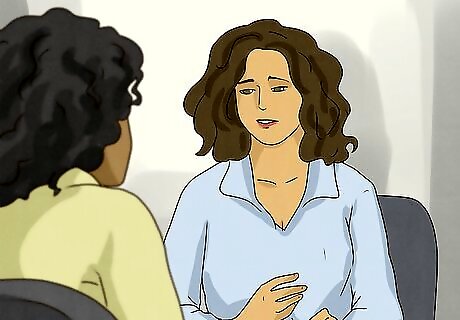
In some cases, antidepressants may help treat anxiety and depression. However, please be aware that they can make your symptoms worse sometimes, too. If nothing else works to decrease your anxiety and depression, discuss it with a reputable psychologist and ask if medication might help you. There is a chance that you will feel worse when you first start taking medication. If you have suicidal thoughts, antidepressants can make these worse. Antidepressants can also reduce your sex drive, performance, and satisfaction. Note that antidepressants can become less effective over time. If you’re taking antidepressants and don’t feel any better or feel like they’re hurting your quality of life, consult your doctor about changing the medication or dosage, or ask for instructions on tapering off the medication.















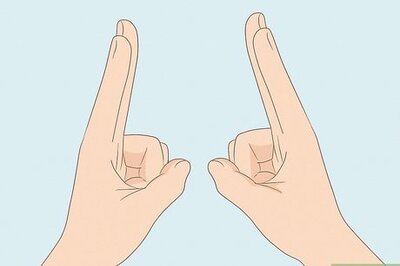
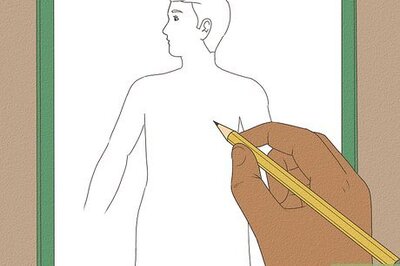
Comments
0 comment